- Home
- Evelyn James
The Woman Died Thrice Page 16
The Woman Died Thrice Read online
Page 16
Clara glanced back at Mr Stover, but his tight lips told her she would get no information from that quarter. It was then she spotted Dr Masters coming down the stairs carrying his medical bag. As the only doctor in the building it seemed a reasonable assumption to imagine he had been called to check over the person who had just left the hotel quite dead. Clara made her way to him.
“What has happened, Dr Masters?” she asked softly, catching the doctor’s arm.
He looked strained, as if he had just seen things he would rather not.
“I need a brandy,” he told her.
They went into the hotel’s lounge where there was a bar. Masters ordered a large brandy and glanced at Clara to see if she wanted anything. She shook her head.
“A little early,” she answered.
“It is too early for whisky, not too early for brandy,” Dr Masters corrected. He took the drink the barman offered him and drained it in two large gulps. Then he motioned that they should walk to the window where they could talk without being overheard.
The window looked into the gardens and in the dusk Clara could see other guests from the charabanc milling on the lawn, upset by what they had seen and uncertain if they were to be allowed back in for dinner. Clara suspected the latter worry troubled them the most.
“There will be a run on the spirits tonight,” Dr Masters mused, watching the clutches of guests wandering around. “I was called to examine the body.”
“I guessed as much,” Clara said. “Who was it?”
“I didn’t know him,” Masters shrugged. “Mr Stover had to identify him. He said he was a man named Captain Arthur Blake.”
Clara actually jumped at hearing the name. It was so utterly unexpected that it stunned her for an instant.
“Did you know him?” Masters asked.
“Only in connection with the sudden death of Mrs Hunt. Also, he was rather rude to Tommy.”
“Well he won’t be rude to anyone ever again,” Dr Masters said with morbid humour. “I think I need another drink. Only the second time I have attended a suicide.”
“Suicide?” Clara said, knowing the colour was draining from her face as she spoke.
“Seems that way,” Masters waved his hand at the barman and called out his order for another brandy. “Hanged himself from the light fixing with his own belt. I’d never seen a hanged man before. I had read about the effects on the body, but to see it was so much different.”
“I can imagine,” Clara’s mind flicked back to a recent case where she had come across such a suicide. The image of the man’s swollen and reddened face, his tongue jarred out of his mouth and his eyes bulging from their sockets would not leave her in a hurry. “But what an odd thing. Why would that young man take his own life?”
Dr Masters said nothing until his brandy had been placed in his hand and he had drunk half of it.
“That is not my field of knowledge,” he said. “I specialise in looking after the living. I imagine those uniforms back there will be the ones solving the riddle.”
“If Inspector Gately takes an interest. Was the coroner called?”
“Yes. He came to the room a little while after I arrived and pronounced the man dead. He concurred with my assessment, well, it was hardly difficult. The man had hung there so long he was rigid.”
Clara started to think about timescales. The body had perhaps hung there all day, allowing plenty of time for rigour mortis to set in. Blake must have killed himself that morning.
“Did he leave a note?”
“I hardly looked for one,” Dr Masters finished his brandy. “Are you seeing his suicide as connected to that of Mrs Hunt?”
Clara did not correct his inference that Mrs Hunt had killed herself.
“From what Tommy told me, Captain Blake was struggling to adjust to civilian life, or at least gave that appearance. He was alone in this world, his parents being dead.”
“How depressing,” Masters glared at his empty tumbler, but the desire to order another was overridden by his common sense. “The door was locked from the inside, if that means anything to you. I know it is the sort of thing that creates a riddle in a detective novel. How was a man murdered if the door was locked?”
“In general, it usually means there was no murder,” Clara said, though she had to admit that on at least one occasion that had proved a misleading conclusion. “Blake was probably just another tortured soul come back from the war. How many of those have we seen?”
“Too many,” Dr Masters agreed. “In any case, I really ought to see my genuine patient. She has probably spotted all this excitement from her window and is wondering what is going.”
Masters put down his brandy glass with a tut at himself. It had been unprofessional to have two. His patient would smell it on his breath. He left Clara by the window.
What Clara wanted was to get inside Captain Blake’s room and see for herself what had occurred. She had no faith in the Inspector, though she was not particularly thinking this was anything but a tragic suicide. She was more curious as to the why, than the how. Was Captain Blake’s death connected to that of his aunt? That was always a possibility. Clara mused over her possible moves a moment longer. The one person who might be of use to her, who might actually listen to her concerns, was the local coroner, and it seemed likely he was still up in Captain Blake’s room. Clara made up her mind. Before the Inspector had time to banish her from this case, she had to act. She abandoned the lounge and went in search of Captain Blake’s room and the scene of the crime.
Chapter Twenty-one
Clara headed upstairs, avoiding the attention of Inspector Gateley. He was busy grilling Mr Stover still, the latter appearing quite distraught. Two of his hotel guests had apparently committed suicide. It was most alarming.
Clara was uncertain which floor Captain Blake’s room was on, but as the policemen who had brought down his body had clearly travelled some distance in the elevator, she assumed it was the third, or possibly fourth. She actually had to travel up to the fifth floor before she came upon the source of all the disturbance. It was obvious when she stepped off the landing that this was the correct floor, for a start there was a policeman just heading to the stairs. Clara gave him a polite nod as he passed her. He did not enquire about her business and was soon heading down. The corridor was otherwise empty, presumably all the other guests on this floor had been tactfully removed while the body was being examined and carried away.
Clara walked along the corridor, pausing at the only open doorway. She looked in to see a bedroom, much like all the other bedrooms in the hotel – a large bed slightly offset from the centre of the room, a nice picture window overlooking the beautiful scenery, a substantial armchair, a dresser, a wardrobe and a bedside cabinet, and a small fireplace. It all looked very cosy and comforting. Had Clara not just learned of what had occurred here, she could not have guessed.
The coroner was standing in the centre of the room, thoughtfully studying a three-armed light fixture set in the middle of the ceiling. His black doctor’s bag was sitting at his side, still open. The remains of a brown leather belt, that had been recently cut through, lay on the floor beside the coroner’s slickly polished black shoes. As Clara watched, he bent down and picked up the fragments and deposited them in a brown paper bag.
“Good afternoon, Miss Fitzgerald,” the police surgeon said, glancing at her at last.
“I heard the news,” Clara explained. “Was it suicide?”
“An inquest will determine that, but it looks very much like it. Captain Blake had looped his belt about his neck tightly. He stood on the armchair to reach this fitting and unscrewed one of the light shades, as you can see here,” the coroner indicated the missing shade. Without it the arm of the light fixture revealed that it was a gas fitting, and the spoke where the gas emerged and could be ignited to light the room was visible. “The wide buckle of the belt was just big enough to slip over this arm. It rested here, where the brass pipe has been clearly crushed.
That was from the weight of Captain Blake hanging off it. With his noose arranged, Blake stepped off the armchair and slowly throttled to death.”
Clara grimaced, it was not a pretty ending. She imagined how the thick edge of the belt must have cut into the man’s chin as he tortuously suffocated.
“How long would it have taken?” she asked, though she rather felt she did not want to know.
“Such slow suffocation takes a considerable time,” the coroner was looking at the light fixture again. “Anything from ten minutes to even an hour, though that is quite an extreme case. Most likely he was unconscious within half an hour, and dead a little after.”
The coroner gave her a stern look.
“Why are you up here Miss Fitzgerald?”
“Because I am concerned, very concerned,” Clara answered. “It may not, as yet, have come to the police’s attention that Captain Blake was Mrs Hunt’s nephew.”
“How extraordinary,” the coroner tapped a finger on his lip absent-mindedly. “That does not give you cause to be up here, however.”
“I thought it might be possible to talk with you,” Clara said, aiming to mollify the man. “Inspector Gateley has no time for me, but I hoped you might. Before she passed Mrs Hunt was concerned someone meant her harm and she had asked me to look into it. I have been following her wishes, even though she is now free of this mortal coil. In that capacity I discovered Captain Blake. And now he is dead too. I really don’t like coincidences, do you doctor?”
The coroner smiled at Clara.
“Dr Frederick Macguire,” he introduced himself. “I suppose this place has a lounge where one might purchase a drink?”
“Yes. Downstairs.”
“Then, I suggest we retire there and I shall see if I can put your mind at ease about these events.”
Clara thought that unlikely, but she agreed to his terms. Dr Macguire placed the paper bag of evidence in his medical bag and went downstairs with Clara. They avoided the foyer and ended up back in the room where Clara had just so recently spoken with Dr Masters.
Dr Macguire ordered himself a glass of tonic water and Clara asked for lemonade. They took their drinks and seated themselves near the window. Dr Macguire seemed very jolly for a man who has just witnessed such a hideous scene, quite the contrast from Dr Masters, though Clara supposed he had witnessed a lot worse in his time as coroner.
“It is rather unusual for me to be called upon twice in the same week,” Dr Macguire said, taking a sip of water. “I have my own small practice which holds my attention when I am not engaged with the police, which is much of the time. This is a nice, rural district. Very quiet, very little crime.”
He seemed to emphasis this last statement as if making a point. Clara decided to ignore it.
“Has there been a post-mortem of Mrs Hunt, as yet?”
“There has. I conducted it. She was drowned. Water in the lungs.”
“Any signs she struggled?”
“No.”
“You see, that is what concerns me,” Clara shook her head. “If you or I were to fall into a lake and start to drown, we would surely try to save ourselves?”
“Unless we wished to drown,” Dr Macguire pointed out.
“Or we were unconscious and could not save ourselves,” Clara countered. “Mrs Hunt did not strike me as a suicidal woman.”
“Many people who take their own lives present as the sort of people who would not do such a thing,” Dr Macguire argued. “Always at the inquest the loved ones get up and state that their dearly departed was simply not the sort to do away with themselves.”
“Perhaps on occasion they are right?”
“In my experience, those who truly contemplate taking their own lives keep the fact very secret and put on a very normal façade for all around to see.”
Clara knew this argument was getting her nowhere, so she changed direction.
“Was anything found on Mrs Hunt’s body or nearby?”
“She had her purse in a pocket, so she was not robbed if that is your thinking.”
“It was not, but please carry on.”
“There was a handkerchief in the other pocket and that was it.”
Dr Macguire took a long drink of his tonic water.
“I have never seen a less suspicious death,” he concluded.
“But it is curious that attempts had been made on Mrs Hunt’s life before she died, and that now her nephew, her sole living relative, is also deceased.”
“Remind me again of these ‘attempts’,” Macguire asked.
“Mrs Hunt was sent poisoned sweets, sadly there are none remaining to examine, but it is apparent that Mrs Hunt briefly ‘died’ two days before her actual death. If the sweets were poisoned, she had a lucky escape. Mrs Hunt’s medical history does not indicate that she should be prone to sudden collapse, in fact her only illness was not a life-threatening one.”
“What condition was that?” Macguire interrupted.
“Parkinson’s. In the very early stages, so, as I stated before, not currently life-threatening.”
“Indeed. You have been actively studying this case. Do go on.”
“The second incident had the appearances of an accident, but coupled with the previous night’s misadventure it takes on a new light,” Clara took a breath. “Mrs Hunt was climbing the stairs in this hotel to go to her room, a room she insisted on changing to from her original one, when a chamber pot came flying down from above and struck her on the head.”
Dr Macguire stifled a chortle.
“I apologise, it is not amusing, yet it does rather sound like a skit from a play. Death by chamber pot is a new one on me.”
“Mrs Hunt survived this encounter too. But it is rather mysterious, considering the chamber pot is unlikely to have been simply dropped by accident. To fling it down the stairs would require it to be thrown, or lifted over the high bannisters.”
“I will admit Mrs Hunt appears to have attracted dreadful luck. But I honestly can say that there is no evidence of foul play at her actual death. If someone had held her down in the water, I would have expected to find bruising where they had gripped her. If they struck her before she went into the water, then I should expect to find a wound or bump on the back of the head. There is nothing of the sort.”
“And what if they gave her something that sedated her?” Clara pressed. “Something to render her unconscious before she tumbled in? This killer has demonstrated themselves a poisoner once already.”
“Let us pause for a moment and ask ourselves another question,” Macguire held up a finger. “Supposing Mrs Hunt was murdered, are we imagining the deed was committed by her nephew who is now also deceased? Perhaps inferring that he suffered from a guilty conscience and hung himself out of regret.”
“That possibility has crossed my mind,” Clara admitted. “Though Captain Blake had no love-loss for the woman, and nor was he a stranger to death. For his conscience to suddenly get the better of him strikes me as unlikely, though not impossible.”
“Well, I shall see what my post-mortem presents to me, but for the moment it seems very straightforward. The room was locked from the inside, after all, the key was on the bedside table. Had not a maid been sent up to change the sheets and let herself in with the master key, no one would have known,” Dr Macguire drained his glass. “Unless we propose the killer clambered out of the window, on the fifth floor of this establishment, no less, then I think we can exclude someone else being involved.”
Dr Macguire rose and collected his medical bag. He gave her a nod as he departed the lounge. Clara sighed as he went, feeling she had not even come a step further forward. She was about to leave, when the strange, emaciated girl she had noticed at breakfast the other day suddenly appeared.
She looked just as waif-like as before, there seemed not an ounce of flesh on her bones. She was almost painful to look at. She drifted over to the window and looked out at the guests still milling on the lawn of the hotel. Then her eyes drifted to Clar
a.
“What has happened?” she asked.
“A man has killed himself,” Clara answered, realising this was the first time she had heard the waif speak. It was a surprisingly strong voice, not thin nor weak as her appearance might have suggested.
“John looked most distressed,” the girl said, almost under her breath, but Clara heard it nonetheless. “At least this means I have a good reason to avoid dinner.”
Clara studied the girl for a moment, then an observation sprang into her mind.
“You don’t like food, or rather, eating, do you?” she said.
The girl gave her a gentle smile.
“No, not really.”
Then she drifted away as silently as she had arrived, exiting out of the door like a ghost that had barely been there at all. Clara watched her go with all her curiosity aroused. Could the John she mentioned be one and the same as Dr Masters? What an intriguing thought. Perhaps the good doctor had more than one patient in the hotel?
Chapter Twenty-two
Upon seeing the calamity in the hotel foyer, Annie had quickly shuffled herself and Tommy out of the way. Clara was clearly going to take an interest, but that did not mean they all had to get involved. Tommy had protested, but Annie hushed him, reminding him that sometimes it was more prudent to sit back and observe rather than ask questions.
“Let Clara poke her nose in,” she said. “While we watch what happens from the side lines.”
Annie had one thought in particular on her mind, and it involved the little maid who was clearly distressed by whatever had gone on while they were out. The girl was being comforted by another maid, but it wasn’t long before Mr Stover could no longer abide seeing his hotel in an uproar, and told the other maid to return to her duties. Dinner had to be served on time. Rooms had to be swept, dusted, and the bed sheets changed. There were living people to worry about.
The distressed maid was left all alone, virtually ignored, even by the police who had already dragged a sobbing statement out of her about how she had opened the room door and seen Captain Blake hanging. She howled pathetically into her hanky. It was now Annie ‘poked her nose in’.

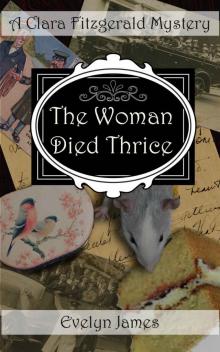 The Woman Died Thrice
The Woman Died Thrice The Poison Pen
The Poison Pen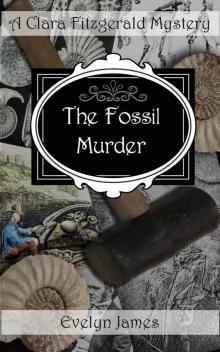 The Fossil Murder
The Fossil Murder The Green Jade Dragon
The Green Jade Dragon Murder on the Mary Jane
Murder on the Mary Jane Murder and Mascara
Murder and Mascara Mr Lynch's Prophecy
Mr Lynch's Prophecy The Traitor's Bones
The Traitor's Bones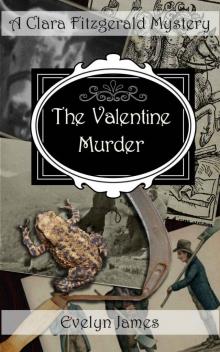 The Valentine Murder
The Valentine Murder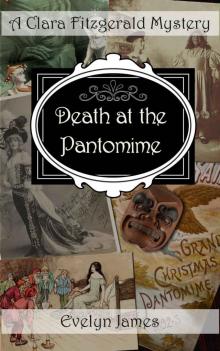 Death at the Pantomime
Death at the Pantomime The Cowboy's Crime
The Cowboy's Crime The Trouble With Tortoises
The Trouble With Tortoises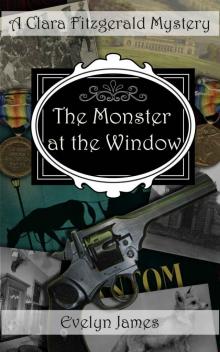 The Monster at the Window
The Monster at the Window